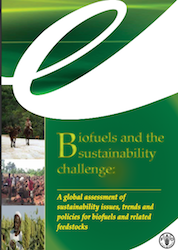 Senators Bob Corker (R-Tenn.) and Robert Menendez (D-NJ) have introduced the Energize Africa Act, legislation promoting electrification in sub-Saharan Africa. The House passed companion legislation, H.R. 2548, on May 6, 2014. The Energize Africa Act prioritizes and coordinates U.S. government resources to achieve three goals in sub-Saharan Africa by 2020: promote first-time access to electricity for at least 50 million people in Sub-Saharan Africa by 2020; encourage the installation of at least an additional 20,000 megawatts of electrical power using a broad mix of energy options to help reduce poverty, promote sustainable development and drive economic growth; and encourage the necessary in-country reforms to make such expansion of power access possible.
Senators Bob Corker (R-Tenn.) and Robert Menendez (D-NJ) have introduced the Energize Africa Act, legislation promoting electrification in sub-Saharan Africa. The House passed companion legislation, H.R. 2548, on May 6, 2014. The Energize Africa Act prioritizes and coordinates U.S. government resources to achieve three goals in sub-Saharan Africa by 2020: promote first-time access to electricity for at least 50 million people in Sub-Saharan Africa by 2020; encourage the installation of at least an additional 20,000 megawatts of electrical power using a broad mix of energy options to help reduce poverty, promote sustainable development and drive economic growth; and encourage the necessary in-country reforms to make such expansion of power access possible.- Green Plains Inc. has announced the appointment of Mr. Gene Edwards to its board of directors effective June 19, 2014. Edwards served as Executive Vice President and Chief Development Officer of Valero Energy Corporation until his retirement in April 2014.
- A wave of new methanol plants spurred by a surplus of natural gas may lead to a glut of methanol in the US by 2018, according to a new study released by global energy news and price reporting organization Argus. The Argus JJ&A Methanol Dynamics study is a comprehensive analysis of the global methanol market with a particular focus on China—the world’s largest methanol market—and the fast-moving US industry. The study also provides a series of 20-year price forecasts for key regions, as well as a global supply and demand outlook and a production cash cost comparison of all methanol producers around the world.
- Siva Power, a leader in advanced solar energy, today announced it has received an initial investment in a $15 million round to help scale the manufacturing of its industry-leading thin film solar technology, which can surpass the U.S. Dept. of Energy’s SunShot Initiative target of solar module cost of $0.50/watt. The company has also hired solar industry veteran Leroy Luo as president of Siva Power China to lead operations in that market.
Fight Over Clean Power Plan Gets Dirty
I’ve written a bit about the Clean Power Plan – the U.S. Environmental Protection Agency’s proposed plan to reduce carbon emissions from utility plants by 30 percent by 2030. The plan has caused hope and consternation and both environmental groups and the utility industry is weighing in.
The Natural Resources Defense Council (NRDC) has cited a new disinformation campaign has been waged by “Big Polluters” who they say are intent on subverting the country’s first ever carbon pollution standards (aka, Clean Power Plan. In response, NRDC has launched a campaign of it’s own in response to the U.S. Chamber of Commerce Study and National Mining Association (NMA) who say that putting limits on carbon will increase electricity prices. However, both the Washington Post and Denver Post have fact checked the study and claims and found some of them to be false.
“The real truth is: We need to cut the carbon pollution spewing out of power plants to protect our health and future generations. We can do this, and save people money on their electric bills even as we invest in energy efficiency that creates hundreds of thousands of new jobs,” said Peter Altman, director of NRDC’s Climate and Clean Air Campaign.
NRDC launched the ad on national television outlets and digital platforms to challenge critics of carbon pollution standards proposed on June 2 by the U.S. Environmental Protection Agency. The standards, when finalized says NRDC, can reduce carbon pollution at least 30 percent by 2030 by empowering states and utility companies to work together to make reductions in the most cost-effective way for each state.
In addition to debunking opponents’ claims, the NRDC ad goes after Big Polluters’ efforts to undermine energy efficiency initiatives in a number of states. For example, utility and fossil fuel-funded front groups peddled disinformation to attempt a freeze on Ohio’s Alternative Energy Portfolio Standard (AEPS) and Energy Efficiency Resource Standard (EERS) in 2014.
But ramping up energy efficiency, NRDC has shown, can help accomplish the goals of President Obama’s Climate Action Plan, and help consumers. NRDC recently released an analysis showing that strong limits on carbon pollution from existing power plants could save Americans $37 billion on their electric bills and create a net 274,000 jobs. These jobs, growing mostly through investments in energy efficiency and renewables, can put to work electricians, roofers, carpenters, insulation workers, heating/air conditioning installers and heavy equipment operators, among others.
Nebraska Wind Farm Dedicated
 A new wind farm has been dedicated in Nebraska. This story from the Lincoln Journal Star says Gov. Dave Heineman, along with about 100 local residents and officials, attended the dedication of the Steele Flats wind farm.
A new wind farm has been dedicated in Nebraska. This story from the Lincoln Journal Star says Gov. Dave Heineman, along with about 100 local residents and officials, attended the dedication of the Steele Flats wind farm.
The wind farm sits on about 10,500 acres of privately owned agricultural and ranch land. Its 44 General Electric turbines can generate as many as 1.7 megawatts of electricity, enough to meet the energy needs of about 19,000 homes.
The wind farm began generating power in November 2013, two months ahead of schedule. The project represents a $138 million capital investment and is owned and operated by an affiliate of NextEra Energy Resources.
“I’m excited that NextEra Energy has built a wind farm in Nebraska,” Heineman said in a news release. “Wind energy helps our local and state economy and is an important step toward our own energy future.”
The project has a 20-year contract that has the Nebraska Public Power District buying all of the power generated.
Targray Achieves Biodiesel Certification
 Canadian biodiesel maker Targray has achieved a key market certification. This company news release says its biodiesel gained BQ-9000 Marketer Certification through the National Biodiesel Accreditation Commission (NBAC).
Canadian biodiesel maker Targray has achieved a key market certification. This company news release says its biodiesel gained BQ-9000 Marketer Certification through the National Biodiesel Accreditation Commission (NBAC).
“We’re always actively seeking to be a steward for responsibility within the biodiesel industry,” said Andrew Richardson, President of Targray. “Being able to achieve this quality standard is something we are proud of and we’re certain that it will project a message of responsibility to our clients. Targray biodiesel clients can be sure that the fuel they are buying is of the highest quality, has been thoroughly tested, and that our organization is being regularly audited to assure quality throughout each link of our supply chain. At Targray we take quality and compliance seriously.”
Targray’s BQ-9000 Marketer Certification applies to its entire inventory and will span every gallon of biodiesel sold by the company. Targray markets to both United States and Canadian fuel industries.
The accreditation represents a combination of the ASTM standard for biodiesel, ASTM D6751 and a quality systems program that includes storage, sampling, testing, blending, shipping, distribution and fuel management practices.
Solar to Grab Spotlight in Iowa
Solar power in Iowa will step into the spotlight this weekend as the state hosts a series of workshops today and tomorrow. This story from the Des Moines Register says the events at 10 locations throughout the state start at 10 this morning when state Sen. Robert Hogg hosts an the kick off for “Solar Works For Iowa” at Des Moines Onstage, which recently added a 22.6 kilowatt solar generating facility installed by Green Light Renewable Service and EcoWise Power.
 Hogg said recently expanded state solar tax credits will help Iowa homeowners, farmers, and businesses invest in solar power. As of mid-June, solar energy tax credits passed in 2012 had helped a total of 739 solar projects worth $28.8 million in investment, he said. The amount of state tax credits awarded was $3,430,502.
Hogg said recently expanded state solar tax credits will help Iowa homeowners, farmers, and businesses invest in solar power. As of mid-June, solar energy tax credits passed in 2012 had helped a total of 739 solar projects worth $28.8 million in investment, he said. The amount of state tax credits awarded was $3,430,502.
Here is the schedule for other events being held around the state:
> Friday, June 20, 12:30 p.m. – University of Iowa, Madison Street Services Building, 640 South Madison Street, Iowa City.
> Friday, June 20, 1:00 p.m. – Eagle Point Solar, 900 Jackson Street Suite 108, Dubuque.
> Friday, June 20, 2:30 p.m. – John T. Blong Tech Center, Eastern Iowa Community College, 8500 Hillandale Road, in Davenport.
> Saturday, June 21, 10:00 a.m. – Residence, 1902 West 12th Street, Cedar Falls.
> Saturday, June 21, 11:00 a.m. – IBEW Local 405, 1211 Wiley Blvd SW, Cedar Rapids.
> Saturday, June 21, 11:00 a.m. – Guided tour of solar installations and the wind turbine at Luther College departs from Decorah Farmers’ Market.
> Saturday, June 21, 11:00 a.m. – Home of Joe Olsen, 2003 206th Street, just northeast of Independence.
> Saturday, June 21, 11:00 a.m. – Sustainable Living Center, MUM, Fairfield.
> Saturday, June 21, 2:00 p.m. – Marshalltown Public Library, 105 W. Boone Street, Marshalltown.
Ethanol Production Hits Record High
 U.S. ethanol production has hit a record high. This story from Reuters says it was the the sixth week in a row production rose for ethanol, which was helped by rising gasoline prices.
U.S. ethanol production has hit a record high. This story from Reuters says it was the the sixth week in a row production rose for ethanol, which was helped by rising gasoline prices.
Ethanol production surged 28,000 barrels per day, or about 3 percent, to an average of 972,000 bpd in the week ending June 13, according to the U.S. Energy Information Administration. Production surpassed the previous record of 963,000 bpd reached in the last week of 2011.
Despite the higher output, strong demand squeezed stocks of ethanol, which fell 572,000 barrels to 17.85 million barrels, a three-week low.
Makers of the biofuel are earning near-record profits as prices for corn, the main feedstock used in ethanol production, hovered near a four-month low.
The story goes on to say that gasoline futures have a $1-per-gallon premium over ethanol futures that makes ethanol good for fuel blenders.
Biobased Products – How Important for Ag?
 Our latest ZimmPoll asked the question, “How would you rate the job farmers are doing telling consumers where their food comes from?” It looks as though many of you feel their efforts are good to fair, but as farmers continue to engage in storytelling activities such as the Food Dialogues and social media, more can be done.
Our latest ZimmPoll asked the question, “How would you rate the job farmers are doing telling consumers where their food comes from?” It looks as though many of you feel their efforts are good to fair, but as farmers continue to engage in storytelling activities such as the Food Dialogues and social media, more can be done.
Our poll results:
- Great – 10%
- Good – 30%
- Fair – 35%
- Bad – 20%
- Other – 5%
Our new ZimmPoll is now live and asks the question, “How important are bio-based products for agriculture?” “We want to get to the point where we’re using everything we grow and everything we raise” to create jobs, help the environment and reduce petroleum use, Agriculture Secretary Tom Vilsack said in an interview with USA Today. What do you think – will it encourage growth in rural communities and encourage consumers to understand what’s in the products they’re using?
American Drivers Can Save 61 Cents Choosing E85
Fuels America wants Americans to know that as turmoil in Iraq pushes gas prices up, ethanol can save them money. In an analysis of data covering the past year from E85prices.com shows that drivers with “Flex Fuel” vehicles in the U.S. can pay an average of $0.61 less per gallon by filling up with E85, which contains up to 85 percent American ethanol.
The association notes that ethanol is a higher octane fuel that improves engine performance, and that’s why it has been added to gasoline for decades. Today it is now being blended at higher levels into the fuels used throughout professional auto racing. Prices for American-grown renewable fuels like ethanol and advanced biofuels have grown increasingly competitive thanks to America’s Renewable Fuel Standard (RFS), which ensures that homegrown renewable fuels are available as an option to American consumers. In addition to saving American drivers money, the RFS has helped to support 852,000 jobs and $184.5 billion in economic output in the U.S.
The analysis of data from “E85 Prices” also revealed that drivers nationwide have at times saved as much as $0.76 per gallon at the pump over the past year by filling up on E85. And because ethanol increases the available fuel supply, it helps to drive down the price of gasoline for all drivers regardless of whether they choose a higher blend fuel like E15 or E85.
Meanwhile, violen ce in Iraq is driving high gas prices even higher than predicted. Fuels America notes that mere worries about oil supply issues have already helped drive world and U.S. prices to their highest levels since September. Americans could see prices for regular gasoline jump more than $0.20 per gallon over the next couple weeks as violence in Iraq continues.
ce in Iraq is driving high gas prices even higher than predicted. Fuels America notes that mere worries about oil supply issues have already helped drive world and U.S. prices to their highest levels since September. Americans could see prices for regular gasoline jump more than $0.20 per gallon over the next couple weeks as violence in Iraq continues.
Fuels America’s announcement coincides with a paid advertising campaign to highlight the consumer savings the RFS and the renewable fuels industry deliver for Americans. This week, the coalition is running digital ads that ask Americans why we should “let Big Oil pump us dry,” and call on our leaders to “invest in affordable, homegrown renewable fuels” by protecting America’s Renewable Fuel Standard.
UC Riverside Named an Energy Frontier Research Center
The U.S. Department of Energy (DOE) Secretary Ernest Moniz has announced $100 million in new funding for 32 new Energy Frontier Research Centers (EFRCs). The EFRCs are designed to accerlerate the scientific breakthroughs needed to build a new 21st century energy economy in the U.S. One of the new research centers will live at University of California- Riverside (UC Riverside). “Spins and Heat in Nanoscale Electronic Systems” (SHINES) will receive $12 million over four years from DOE. The lead researcher is UC Riverside Professor of Physics Jing Shi, who will work with researchers from seven universities. SHINES is one of 10 new projects announced, along with 22 other projects receiving new funding based on achievements to date.
“Today we are mobilizing some of our most talented scientists to join forces and pursue the discoveries and breakthroughs that will lay the foundation for our nation’s energy future,” Secretary Moniz said. “The funding we’re announcing today will help fuel innovation.” He said the intent of the Energy Frontier Research Centers is to make fundamental advances in solar energy, electrical energy storage, carbon capture and sequestration, materials and chemistry by design, biosciences, and extreme environments.
 “I am happy to hear the news,” said Shi, the UCR physics professor who has put together an interdisciplinary team of researchers from UC Riverside, UCLA, Johns Hopkins, Arizona State University, University of Texas, Austin and Colorado State University, Fort Collins. “I’m looking forward to seeing the scientific advances that they come up with,” said Michael Pazzani, UC Riverside’s Vice Chancellor for Research and Economic Development. “This is exactly the kind of scientific leadership that UC Riverside has been encouraging and supporting This project will lay the groundwork for energy technology for the nation.”
“I am happy to hear the news,” said Shi, the UCR physics professor who has put together an interdisciplinary team of researchers from UC Riverside, UCLA, Johns Hopkins, Arizona State University, University of Texas, Austin and Colorado State University, Fort Collins. “I’m looking forward to seeing the scientific advances that they come up with,” said Michael Pazzani, UC Riverside’s Vice Chancellor for Research and Economic Development. “This is exactly the kind of scientific leadership that UC Riverside has been encouraging and supporting This project will lay the groundwork for energy technology for the nation.”
SHINES will investigate several aspects of basic research: new ultrathin films, nanostructured composites, high resolution imaging, the transport of electrical signals, heat and light. “All of it will be studied, modeled and simulated in order to help the nation’s ability to advance in the way we use energy,” said Shi, the lead researcher.
GRFA: UN Sustainable Goals Must Include Biofuels
This week the 12th session of the Open Working Group on Sustainable Development Goals began at the United Nations in New York City. In response to the meeting, the Global Renewable Fuels Alliance (GRFA) is encouraging participants to include specific targets for biofuels developments as part of UN’s sustainability goals. In addition, GRFA stressed to delegates that the use of sustainable biofuels as a replacement for crude-based ![]() transportation fuels significantly reduces greenhouse gas emissions while diving investments in agriculture.
transportation fuels significantly reduces greenhouse gas emissions while diving investments in agriculture.
“As participants continue to set new UN Development Goals for the next fifteen years they must keep in mind the positive affects that the global biofuels industry has on agriculture, the environment and the energy sector,” said Bliss Baker, spokesperson for the GRFA.
According to GRFA, the global ethanol industry alone this year will produce 90.38 billion litres of ethanol which will help the environment by reducing GHG emissions by 106.4 million tonnes. This year’s production record will reduce global GHG emissions by over 291,000 tonnes per day. This is equal to 21,279,808 cars being removed from the world’s roads in 2014 OR removing more than all of the vehicles registered in Malaysia off the road each year.
“Global biofuel production and use leads to a more sustainable environment because ethanol use is the largest single contributor to GHG reductions in transportation and the only commercially available alternative to crude oil,” added Baker.
The agriculture sector has also benefited from biofuels production over the years as developing countries adopt biofuel-friendly policies, said Baker. According to a recent publication of the United Nations Food and Agriculture Organization (UN FAO), “Increased agricultural productivity and output has ensured that the global supply of crops available for non-biofuel uses has continued to grow over the long term.” Additionally, for every tonne of cereals used for ethanol production, on average one-third re-enters the food chain as animal feed. The UN FAO confirmed this in its report “Biofuels and the Sustainability Challenge,” stating that “the by-products of biofuel production can be useful sources of food”.
non-biofuel uses has continued to grow over the long term.” Additionally, for every tonne of cereals used for ethanol production, on average one-third re-enters the food chain as animal feed. The UN FAO confirmed this in its report “Biofuels and the Sustainability Challenge,” stating that “the by-products of biofuel production can be useful sources of food”.
“In short, the global biofuels industry has increased the amount of food available for human consumption and feed available to farmers for livestock around the world,” said Baker.
The creation of sustainable green jobs going forward has become a priority for governments around the world. In 2012 the GRFA released a report that found that in 2010, global ethanol production supported nearly 1.4 million jobs in all sectors worldwide and contributed over $273 million to the global economy. A recent IRENA commissioned report confirmed that the global biofuels industry has grown, finding that in 2013, 1.45 million jobs were supported by the global liquid biofuels industry.
“It’s clear that because of the global biofuel industry’s ability to reduce our reliance on crude oil, reduce GHG emissions, increase agricultural productivity and create millions of jobs, the UN’s Sustainable Development Goals post 2015 must encourage further growth of the global biofuels industry,” concluded Baker.


